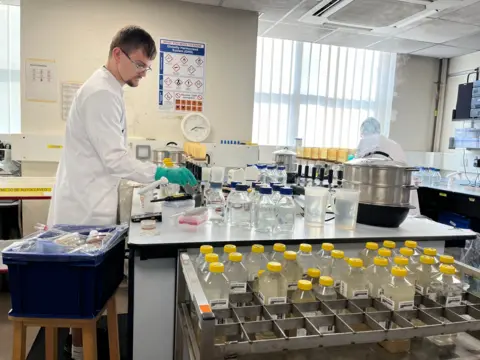
BBC environment correspondent
 Jonah Fisher/BBC
Jonah Fisher/BBCThousands of water tests to identify potential harmful pollution in rivers, lakes and estuaries in England have been cancelled in the last three months due to staff shortages, the BBC has learned.
The Environment Agency confirmed the cancellations after campaigners showed us internal emails and documents with plans for extensive cuts to monitoring programmes.
The cancelled tests are for so-called inorganic pollutants – substances such as nitrates and phosphates that can indicate sewage or agricultural pollution.
The EA says its testing programme “remains robust” but this week a landmark report said it had “struggled to effectively oversee and manage the water system”.
In the three months from May to July the water regulator says that 10,000 scheduled tests at its main laboratory at Starcross in Devon did not take place due to staff shortages.
Others were combined with other tests or postponed in what the EA says was an “optimisation” process.
The Environment Agency said seven national inorganic testing programmes had been completely “paused”. They include programmes that track chemical pollution in rivers, lakes and estuaries as well as one that monitors the regulator’s plans for dealing with drought.
Jo Bradley, who worked at the Environment Agency’s water quality team for more than 20 years, told the BBC: “Some inorganic substances, such as copper and zinc, are directly toxic to aquatic organisms, including fish and insects,”
“Others, such as phosphorus and nitrogen, are nutrients and they can affect river health when they are present in high quantities.
“These substances must be tested routinely, at many hundreds of locations, so that we can see trends in river chemistry and quickly identify problems.”
The EA said it “paused” 17.5% of its inorganic testing at the Starcross Laboratory from May to July.
Over the entire year it said it was expecting to operate at 15% below capacity.
A spokesperson blamed the reduction in tests on “fluctuations in staffing capacity” and could not say when the laboratory would be working at full capacity again.
Staffing problems are nothing new at the EA. In 2023 its chairman Alan Lovell told parliament that it had “struggled with recruitment and retention of staff”.
Internal emails obtained by campaign groups Greenpeace and Desmog through freedom of information requests were shared with the BBC. They show EA officials discussing the impact of staff departures on testing and saying that others planned to leave.
One senior official, writing an email to her colleagues, said it was “not good news I’m afraid” adding “this isn’t where we want to be (again)”.
Helen Nightingale, who worked at the Environment Agency as a catchment planner, analysing data from its water quality programme until 2022, says that while she was there she saw a shift of focus away from serious investigation to trying to find “successes”.
She also said that morale was low: “The pay is not great – we didn’t have pay rises for years due to austerity,
“But a lot people are in it [the EA] because they want to make a difference – and when you’re not even getting that – well, what’s the point?”
Documents seen by the BBC show that the work affected by the cuts to testing this year included investigations into the water industry in various parts of the country, and monitoring of protected areas including the River Wye, which is currently facing a pollution crisis linked to intensive chicken farming.
Stuart Singleton White from the Angling Trust which has been running its own citizen scientist testing programme., said: “This spring, while the EA cut 10,000 water samples, our Water Quality Monitoring Network collected its 10,000th.
“Our latest annual report showed that 34% of sites breached “good ecological status” for phosphate, and 45% showed signs of nitrate pollution. Pollution is out of control, and extensive testing is key to addressing the problem.”
Singer-turned-campaigner Feargal Sharkey said the cancelled tests are further confirmation of the EA’s limitations.
“When is a regulator not a regulator? When it’s the Environment Agency,” Mr Sharkey told the BBC.
“With impeccable timing the Environment Agency reminds us all of exactly why they to should be added to Sir Jon Cunliffe’s bonfire of the quangos [the Water Commission]. Institutionally incompetent, complacent and discredited.”
This week, Sir Jon recommended that a single water regulator be created, with the EA handing over responsibility for monitoring water pollution.
A spokesperson for the EA said: “We are committed to protecting the environment and water quality testing remains a top priority having received an extra £8m in funding.”
“Our water quality testing programme remains robust and prioritised on the basis of need – only a small proportion of tests were impacted by this issue, with no impact on pollution incidents and bathing water testing.”


